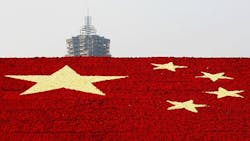Even as regulators at home and abroad block deals, Chinese acquirers will spend $1.5 trillion buying companies abroad in the next decade, 70%more than the previous 10 years, Linklaters LLP said in a report on July 8.
Government policies encouraging Chinese companies to invest in manufacturing capabilities, particularly for advanced technology, and international trade will help maintain deal flow, the law firm, which specializes in advising on mergers and acquisitions, said in the report. Chinese buyers have spent about $880 billion on assets in other countries in the last 10 years, according to the data.
The success of China’s bidders will depend on their ability to overcome foreign countries’ concerns about national security and interest, which contributed to the failure of as much as $75 billion in announced outbound deals last year, Linklaters said in the report. China may also have to bow to international pressure to liberalize its markets, it said.
“While the pace of outbound deals has declined in 2017, China’s long-term aspirations” mean that overseas “investment and acquisitions from China will continue to be a significant force over the long term,” Linklaters said.
Regulators have generally blocked Chinese businesses’ bids for companies in industries seen as critical to their economies or national security, such as infrastructure and technology. Aixtron SE, the German semiconductor equipment maker, saw its planned sale to a Chinese-backed company collapse in December after the U.S. government opposed the deal. Push-back from the same group, the Committee on Foreign Investment in the U.S., led to the termination of Chinese firm GO Scale Capital’s $2.8 billion bid for Royal Philips NV’s lighting unit, Lumileds.
A rebound in M&A will also rely on a softening of the Chinese state’s stance toward large, overseas deals, which some in the government see as a threat to the country’s growth. Its regulators are assessing the dangers that these prolific acquirers, and the debt they’ve run up, pose to China’s banking system and economy.
HNA Group Co., the Chinese aviation and shipping giant that’s behind some of the biggest overseas deals, is among acquisitive companies under increased government scrutiny. Several major Chinese banks that have helped fund HNA’s deal spree have stopped issuing new loans to the company, people familiar with the matter said last month.
“Despite potentially increased scrutiny by Chinese regulators and banks of some of the deals underlying these flows, we expect China to remain ‘open for business’ with respect to genuine strategic overseas acquisitions,” Linklaters said in the report. “If such investments are blocked in some jurisdictions, this may redirect Chinese players’ interest towards other jurisdictions.”
By Sarah Syed
About the Author
Bloomberg
Licensed content from Bloomberg, copyright 2016.
